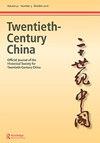Listening to the Enemy: Radio Consumption and Technological Culture in Maoist China, 1949–1965
IF 0.4
Q1 HISTORY
引用次数: 0
Abstract
Abstract:Drawing from a substantial body of government archives and internal reports from mainland China, the United States, and Taiwan, this article examines how daily transnational and technological communication practices among the masses impacted the making of political culture in Maoist China. The article begins with an overview of the pervasiveness of listening to enemy radio—the overseas radio stations unsanctioned by the government of the People's Republic of China (PRC)—followed by an in-depth analysis of the historical legacies, ideological and cultural rationales, and structural deficiencies that contributed to that popularity. It then explores how local radio users' responses and active reaching out to enemy radio stations in the 1950s and 1960s prompted the competing geopolitical powers facing off across the Taiwan Strait to adjust their government policies. Ultimately, this article argues that listening to enemy radio as a technological counterculture was instrumental to the making of socialist subjectivity, arising from the populace's appropriation of the strategic interplay between the PRC government and its Cold War rivals.听敌人:无线电消费和科技文化在中国毛派,1949 - 1965
摘要:本文从中国大陆、美国和台湾的大量政府档案和内部报告中,考察了大众之间的日常跨国和技术交流实践如何影响毛时代中国的政治文化。这篇文章首先概述了收听敌方电台(未经中华人民共和国政府批准的海外广播电台)的普遍性,然后深入分析了导致这种流行的历史遗产、意识形态和文化理由以及结构缺陷。然后,它探讨了20世纪50年代和60年代,当地电台用户的反应和与敌方电台的积极接触,是如何促使台湾海峡对岸的地缘政治大国调整政府政策的。最后,本文认为,收听敌方电台作为一种技术反主流文化,有助于社会主义主体性的形成,这源于民众对中国政府与其冷战对手之间战略相互作用的挪用。
本文章由计算机程序翻译,如有差异,请以英文原文为准。
求助全文
约1分钟内获得全文
求助全文

 求助内容:
求助内容: 应助结果提醒方式:
应助结果提醒方式:


